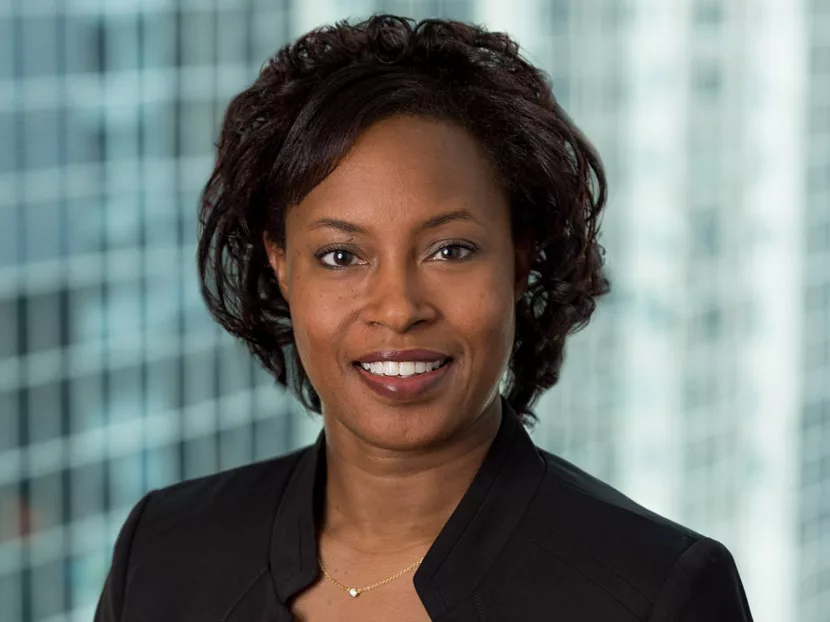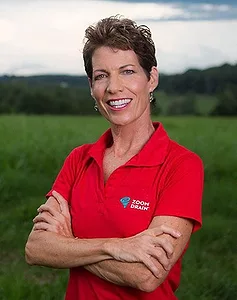Why are there so few women in our industry? Yes, we are making progress. However, when I spotted Pamela Belyn on the WWETT Show floor, she definitely got my attention. As a drain-and-sewer business owner and a woman of color, I was eager to learn more about her. Here is her inspiring story, in her words:
“I started my career as a banker, then became a corporate attorney. I often represented clients who owned ‘blue collar’ companies. I’d act as their general counsel, which means I’d get the call if they ran into some kind of trouble. Sometimes they would be stuck on a legal/operational issue. Once we got past the crisis of the moment, I’d help them implement systems to keep them on the right path.
“I did this for several years. Then I got to thinking that these guys have got it pretty good. There was nothing sexy about their businesses. Yet, they were living the life they wanted and some of them were making really good money. But one client solidified my thought process.
“This client, the owner of a commercial janitorial company, was in his late-70s and ready to retire. He set the selling price for the business at $25 million. Well, months go by with no real offers. I suggested he take it off the market and let me help him ‘fix’ some problems.
“We got to work. I handled some of the little things that should have been handled long ago, such as getting the brand secured and service marks protected. You know, the stuff business owners know they should do, but don’t because they're in the trenches every day. We got the accounting cleaned up, documented systems and implemented basic operating procedures.
“A year later, he put the company back on the market and sold it for $78 million.
“That got me thinking. I was talking to my husband Stephen, ‘I'm sorry, why am I not doing this for myself?’ The next year I spent considering how to transition my legal and operational expertise to business owner. What industry would be a good fit?
“Pretty quickly, I narrowed it down to something in infrastructure because we know it must be the next wave of spending in this country or everything's going to fall down around our ears. I thought about which industry segments are recession-proof. ‘What’s one thing people are going to pay for regardless of the economy?’ Flushing the toilet!
“A business broker friend introduced me to the woman who owned Men in Sewers, a drain-and-sewer company located in the heart of Chicago. This woman and her husband started the company out of a need to service their own real estate portfolio. She took the reigns as owner/operator, due in part to the advantages of being a woman-owned business in a male-dominated industry.
“I met her and we hit it off, but I was still not sure this was the right business for me. Chicago is a union town and I might have to deal with some challenging ‘good ol’ boy’ roadblocks. As we talked more about her experience — she was a schoolteacher — and the future of the industry, it all came together. I thought, ‘Why not?’ and I bought the company in 2016.
“Because we had a good rapport, it made the transition easier. I had been spending at least a week with every crew in the field. I’m the kind of person who doesn’t ask someone to do something I wouldn’t do myself.
“The techs knew the problems in the business that needed to be fixed. Together, we focused on improving and streamlining the processes, making such processes accessible on iPads. We are obsessed with documentation and customer service. We do business the right way, which enables us to charge a premium in our market.
Support, not judgment
“Being a person of color is less of an issue than being a woman in this male-dominated field. I cannot tell you how many times one of my crewmembers or my field manager is assumed to be my husband and the ‘real owner.’
“There are so many misconceptions about professional women from what she does for a living to what she should ‘look like.’ For example, my kids are in private school and I get ‘the looks’ when I pick them up after a day spent in the field — in my purple steel-toed boots, orange vest and a ridiculous number of keys. Yes, I feel judged for not being fabulous enough to be a private school mom.
“My husband and two children help me keep things in perspective. They are so proud of me, regardless of footwear. The other day, my 8-year-old son was in the basement with my husband. Apparently, the toilet was broken. As I was walking down the stairs, I heard my son say, ‘You better go get Mom.” Like, Dad, you are in over your head here.
“I understand that I am one of a few and I feel a responsibility not only to represent but to develop. I had the opportunity to hear Reshma Saujani speak at the Women’s Business Development Center’s 29th Annual Entrepreneurial Woman's Conference in 2015. She’s the founder and CEO of Girls Who Code.
“While describing the issue in the context of the dearth of women in STEM, she summed it up succinctly, ‘You cannot be what you cannot see.’ The same is true of women in general — and women of color, specifically — in our industry.
“I believe women need to support each other more, especially those of us who are in nontraditional roles. If some in our society won't accept us in these roles, then it must start with us, with women accepting each other for all the things we're capable of. That’s what gives us the strength to go out there and fight the battles with the world for the next generation.
“When I see a woman, a person of color, anyone who is not ‘typical’ in our industry, it makes me want to hug them so that we are all reminded that we are not alone! I love this industry and understand the great opportunities here. I believe in the value of work.
“You know, as a society, we sell college, we sell sexy tech careers, we sell the fabulous lifestyle. However, people forget that all that fabulousness is built on the backs of men and women who keep the toilets running, who take out the trash and who lay cable for the internet infrastructure. Somebody's got to do these not-so-glamorous jobs to keep the fabulousness happening.
“Not everyone in our industry works the way we do. With my legal background, I am going to go the extra mile to make sure we maintain high standards. I’m committed to the craftsmanship without sacrificing operations. I’m committed to creating a place where our team members can find a career path. Some of my guys are getting older, so we are looking at expanding and creating sales positions, warehouse positions. I’m excited about bringing on more young people, especially women, of course, to help them build great careers.
“I know that for some of my team, this work, this business has helped turn their lives around. It gets me up and going every day. My team and their families are depending on me to map a path we can forge and grow.
“The takeaway is this: Don’t knock it until you try it. Being in the sewer-and-drain business is not glamorous, but necessary and certainly lucrative. Be willing to explore nontraditional careers outside of your comfort zone and you may be pleasantly surprised at the lifestyle and wealth of opportunity awaiting you.”
Note: There is a lot more to discuss regarding women and diversity in our industry. Stay tuned; I’ll address this in future columns. And be sure to send me your thoughts and tips at [email protected].






